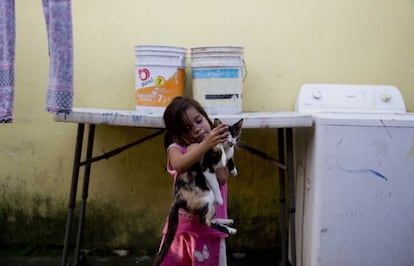Minors flee violence and social exclusion in Honduras
Deliberate misinformation by traffickers has seen a surge in young unaccompanied migrants

In the slums of Honduras, hostile places where only the strongest prevail, children and teens are used by criminal groups to take part in robberies, rape, drug trafficking and arms sales. The violence and social exclusion are pushing growing numbers of these youths into the hands of human traffickers, in the hope of emigrating — often all alone — to the United States.
These minors are “the victims of an exclusionary system,” according to a report by Casa Alianza, the Latin American branch of Covenant House, an international organization for the protection of exploited children. “In recent decades, the country has encouraged a trend that ‘criminalizes’ youths. The mere fact of living on the streets, dressing in a specific way, sporting a tattoo or sitting on a street corner with a group of people is enough for children and youngsters to be classified as bums and criminals,” reads the report.
In Honduras, 45 percent of a population of 7.8 million is aged under 18. Honduras, Guatemala and El Salvador are the biggest sources of unaccompanied children and youths who travel to the southwestern border of the United States, which is struggling to deal with the massive surge in undocumented migrants.
Around 90 unaccompanied minors are leaving every day through 18 “blind spots” along the border
Trapped in a country where 70 percent of the population lives in poverty, the minors are stuck between a rock and a hard place: they can choose to remain in Honduras as social outcasts, or try to migrate to the United States, where their mothers or fathers – sometimes both – are already living. That is if their parents are still alive and in touch with them.
The government of Honduras reported that more than 14,000 minors entered the US illegally between October 2013 and June 2014, compared with 2,500 between October 2012 and September 2013.
This surge is due to false reports being circulated by the coyotes, the people who traffic in human beings, to the effect that the US has approved a migratory amnesty, explains Ana García de Hernández, the First Lady of Honduras and head of a government commission created by her husband, President Juan Orlando Hernández, to deal with the situation.
The misinformation led many parents of Central American minors who live (either legally or illegally) in the US to seek family reunification by paying 5,000 dollars or more to the trafficking rings to bring their children over, despite the dangers of the land crossing through Guatemala and Mexico.
Immigration authorities in Honduras confirmed that around 90 unaccompanied children or youths are leaving every day through 18 “blind spots” along the border between Honduras and Guatemala.
Honduras, Guatemala and El Salvador are the biggest sources of unaccompanied minors to the US
Honduras has designed a Road Map: A Call to Action, which it presented at an international immigration summit held on July 16 and 17 in Tegucigalpa and attended by representatives from the US, Mexico, Guatemala, El Salvador, Honduras, Costa Rica and Panama, as well as the United Nations and other international organizations.
The document suggests designing and implementing a program for more efficient border control and the elimination of these blind spots, as well as greater law enforcement pressure on the trafficking rings.
The program also seeks greater human rights protection for unaccompanied minors in transit countries like Mexico.
The road map calls on the US to establish a clear immigration policy for Central America, and effective communication so that citizens will understand the situation and not be misled by deliberate misinformation by the human traffickers.
Tu suscripción se está usando en otro dispositivo
¿Quieres añadir otro usuario a tu suscripción?
Si continúas leyendo en este dispositivo, no se podrá leer en el otro.
FlechaTu suscripción se está usando en otro dispositivo y solo puedes acceder a EL PAÍS desde un dispositivo a la vez.
Si quieres compartir tu cuenta, cambia tu suscripción a la modalidad Premium, así podrás añadir otro usuario. Cada uno accederá con su propia cuenta de email, lo que os permitirá personalizar vuestra experiencia en EL PAÍS.
¿Tienes una suscripción de empresa? Accede aquí para contratar más cuentas.
En el caso de no saber quién está usando tu cuenta, te recomendamos cambiar tu contraseña aquí.
Si decides continuar compartiendo tu cuenta, este mensaje se mostrará en tu dispositivo y en el de la otra persona que está usando tu cuenta de forma indefinida, afectando a tu experiencia de lectura. Puedes consultar aquí los términos y condiciones de la suscripción digital.








































